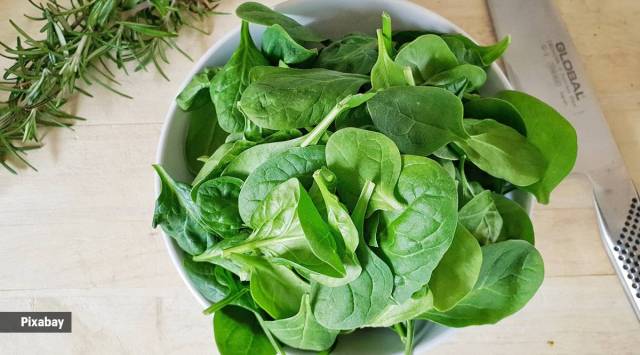Why Vitamin K in spinach, broccoli and lettuce may lower your risk of heart disease
A deficiency accelerates calcium deposits in the blood vessels and increases the risk of cardiovascular disease. Vitamin K causes an anti-inflammatory action, which prevents plaque calcification, says Dr Atul Bhasin, Director, Internal Medicine at BLK-Max Super Speciality Hospital
 Vitamin K is very important for keeping the heart healthy. It has been found that the deficiency of this particular vitamin leads to inactive formation of the protein GLA, which increases the risk factor for vascular calcification. (Pic source: Pixabay)
Vitamin K is very important for keeping the heart healthy. It has been found that the deficiency of this particular vitamin leads to inactive formation of the protein GLA, which increases the risk factor for vascular calcification. (Pic source: Pixabay) At a time when cardiovascular health is in focus, the role of Vitamin K needs to be re-emphasised as part of our preventive diet routines. Vitamin K is a fat-soluble vitamin which the body absorbs easily and it delivers nutrients through fat molecules. The most prevalent forms of vitamin K are vitamin K1 and vitamin K2. Both are essential but science has yet to lay down their differences fully.
Vitamin K has a crucial role in developing blood clots. The authors of the 2019 review, published in the Journal of Nephrology, found that the body requires various proteins for coagulation. Vitamin K is essential for many of these proteins, which are called vitamin K-dependent proteins (VKDPs) to function.
According to Dr Atul Bhasin, Director, Internal Medicine at BLK-Max Super Speciality Hospital, these VKDPs also reduce calcification in arteries and strengthen arterial walls in diabetic patients. A different 2019 review of current research published in the European Journal of Nutrition found evidence that getting enough vitamin K in your diet is linked to a significantly lower risk of coronary heart disease.
How can Vitamin K promote heart health?
Vitamin K is very important for keeping the heart healthy. It has been found that the deficiency of this particular vitamin leads to inactive formation of the protein GLA, which increases the risk factor for vascular calcification. In simple words, a deficiency accelerates calcium deposits in the blood vessels and increases the risk of cardiovascular disease. Vitamin K causes an anti-inflammatory action, which prevents the progression of atherosclerosis and subsequent plaque calcification.
What is its role in bone health?
The deficiency of Vitamin K leads to a very high risk of bone fractures, especially in the hip bones. Whether the supplementation of this particular vitamin K reduces the risk of fracture is still not clear though it has been found to be correlated with bone development. Similarly, it activates few proteins which help in re-mineralisation of the teeth and this also prevents the formation of cavities.
How can Vitamin K be effective in cancer malignancy?
Vitamin K has been found to be very effective in malignancy, because it leads to apoptosis, which is a natural cell death, and autophagy of the cancer cells. It further reduces the resistance of the chemotherapeutic drugs which are being used for the malignancy treatment.
How can one consume Vitamin K daily?
Ideally adults need around 100-300 micrograms of vitamin K2 per day. This is very easily available in green leafy vegetables, particularly spinach, broccoli and lettuce. Carrots also contain a very high quantity of vitamin K. These
vegetables should be consumed daily in good quantities to increase the level of vitamin and fibre in the diet.
Include plenty of green vegetables, fruits, animal products and probiotic foods. Kale, spinach, turnip greens, Brussels sprouts, and dandelion greens are some of the top vitamin K1-packed greens. Fermented foods like sauerkraut, kimchi and kefir offer vitamin K2. Animal products, like high-fat dairy products and egg yolks, also provide dietary vitamin K2.
📣 For more lifestyle news, follow us on Instagram | Twitter | Facebook and don’t miss out on the latest updates!



- 01
- 02
- 03
- 04
- 05




























